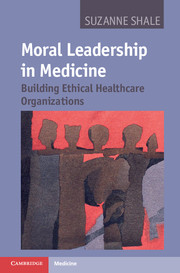Book contents
- Frontmatter
- Contents
- Preface
- Acknowledgements
- Chapter 1 Why medicine needs moral leaders
- Chapter 2 Creating an organizational narrative
- Chapter 3 Understanding normative expectations in medical moral leadership
- Prologue to Chapters 4 and 5
- Chapter 4 Expressing fiduciary, bureaucratic and collegial propriety
- Chapter 5 Expressing inquisitorial and restorative propriety
- Epilogue to Chapters 4 and 5
- Chapter 6 Understanding organizational moral narrative
- Chapter 7 Moral leadership for ethical organizations
- Appendix 1 How the research was done
- Appendix 2 Accountability for clinical performance: individuals and organizations
- Appendix 3 A brief guide to commonly used ethical frameworks
- Index
- References
Epilogue to Chapters 4 and 5
Published online by Cambridge University Press: 05 January 2012
- Frontmatter
- Contents
- Preface
- Acknowledgements
- Chapter 1 Why medicine needs moral leaders
- Chapter 2 Creating an organizational narrative
- Chapter 3 Understanding normative expectations in medical moral leadership
- Prologue to Chapters 4 and 5
- Chapter 4 Expressing fiduciary, bureaucratic and collegial propriety
- Chapter 5 Expressing inquisitorial and restorative propriety
- Epilogue to Chapters 4 and 5
- Chapter 6 Understanding organizational moral narrative
- Chapter 7 Moral leadership for ethical organizations
- Appendix 1 How the research was done
- Appendix 2 Accountability for clinical performance: individuals and organizations
- Appendix 3 A brief guide to commonly used ethical frameworks
- Index
- References
Summary
The concept of the ‘proprieties’ is one of the most novel aspects of my account of moral leadership. Gratifyingly, my account of the proprieties has rung true with the healthcare leaders with whom I work. They have found it a useful tool for understanding some of the tensions they experience in their role; for guiding their deliberations; and for developing expressive ethical performance. Practitioners readily grasp the general idea, and propriety seems to be evident to them in their own practice. As a novel concept, however, it requires some further specification. In this epilogue I consider briefly some of the theoretical and practical issues it raises.
How does my ethical analysis relate to actual practices of propriety?
Throughout Chapters 4 and 5 I introduced the proprieties by reference to normative argument from a number of fields, and then went on to describe how propriety appeared to be performed in practice. So fiduciary propriety was introduced by reference to normative claims about fiduciary obligations in medical ethics and law; bureaucratic propriety was introduced by way of discussion of the benefits of bureaucracy; reparative propriety was introduced after discussion of philosophical claims about the nature of trust; and so on. This approach might elicit three questions from readers. First, was propriety evident in the interview data because the study used a preconceived framework of fiduciary, bureaucratic, collegial, inquisitorial and restorative norms? Second, what is the nature of the association between medical leaders’ behaviour and the norms I have discussed? Third, if medical leaders are not consciously acting according to moral principle, is their behaviour really ‘moral’ behaviour?
- Type
- Chapter
- Information
- Moral Leadership in MedicineBuilding Ethical Healthcare Organizations, pp. 184 - 192Publisher: Cambridge University PressPrint publication year: 2011



